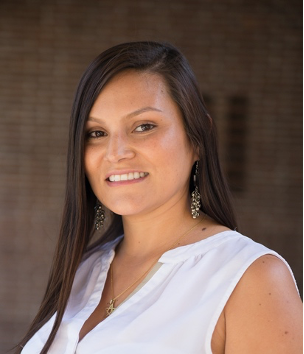By Alexandra Demetriou
On November 20th, 2020, the USC Dr. Allen and Charlotte Ginsburg Institute for Biomedical Therapeutics awarded its inaugural Mordechai “Mort” Arditti Award for Excellence to Alejandra Gonzalez-Calle, PhD, a postdoctoral researcher working to develop vision science innovations at the USC Ginsburg Institute.

Gonzalez-Calle grew up in Medellín, Colombia, and earned a BS in biomedical engineering at La Escuela de Ingenieria de Antioquia. As an undergraduate student, she planned to dedicate her career to developing affordable prosthetic limbs. After an accident that caused her to lose vision in her right eye, however, she redirected her energy toward advancing the field of vision science.
In 2009, Gonzalez-Calle reached out to Mark Humayun, MD, PhD, with the hope that she could pursue a research internship at his team’s USC lab. Humayun and his colleagues had an impressive record of churning out engineering-based solutions to address the biological anomalies causing vision loss, and Gonzalez-Calle aspired to join the ranks of this innovative team. That internship ultimately blossomed into over a decade and counting of collaboratively pioneering interdisciplinary, translational approaches to address some of the most confounding challenges in vision science. During that time, Gonzalez-Calle received one of the USC Viterbi School of Engineering’s highest research awards to support her pursuit of a master’s degree in biomedical engineering, and she later went on to earn a PhD in biomedical engineering in 2017.
Some of Gonzalez-Calle’s most meaningful experiences working with the USC Ginsburg Institute team include fine-tuning the Argus II retinal prosthesis to restore eyesight to patients suffering from complete retinal blindness and contributing to the development of a novel stem cell-based retinal implant for patients with AMD. Recently, she worked with a multidisciplinary team that was able to demonstrate, for the first time, that noninvasive electrical stimulation could be used to slow retinal degeneration in pre-clinical models.
Throughout the years spent working on these remarkable feats in biomedical engineering, Gonzalez-Calle has remained continuously inspired by seeing how the projects to which she has contributed can tangibly enhance patients’ lives. “Being able to see our projects evolve from the basic research stage to the point where they are implanted in patients, and then ultimately seeing how much of a difference these interventions can make in patients’ lives, is what makes me so passionate about what I’m doing,” Gonzalez-Calle says.
Receiving the inaugural Mordechai Arditti Award for Excellence carries special meaning for Gonzalez-Calle due to the fact that the late Arditti was an important mentor of hers throughout her training. Arditti, an electrical engineer by training, often contributed to and enhanced Gonzalez-Calle’s projects by helping to build circuits and essential electrical components of the biomedical devices on which Gonzalez-Calle worked. “He was such a special person for all of us,” Gonzalez-Calle remembers. “Besides being a mentor, he was also a friend to all the PhD students. I’m very grateful to receive this award and to feel like it’s coming from him, even though he’s not here with us anymore.”